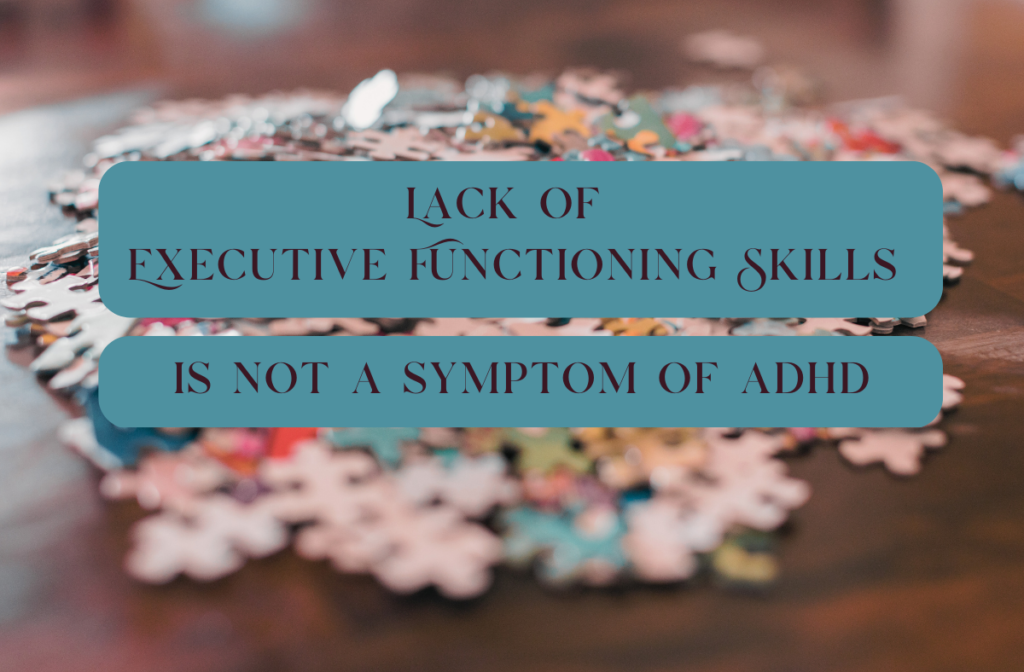

As a mom with ADHD, I know how hard it can be to juggle multiple tasks and manage my time effectively. And when my kids were diagnosed with ADHD, I couldn’t help but wonder if it was my fault. But here’s the thing: lack of executive functioning skills is not a symptom of ADHD. It’s a symptom of trauma. Yes, you heard me right. And in this blog post, we’re going to dig deeper into this topic, and I promise you’ll come out with a better understanding of ADHD, trauma, and how we can support our kids (and ourselves) in navigating these challenges.
Let’s start with the basics. What are executive functioning skills, and how do they relate to ADHD and trauma? Executive functioning skills are cognitive processes that help us manage our lives. These include organizing, planning, prioritizing, shifting our attention, and regulating our emotions. When a person struggles with these skills, they may struggle with procrastination, forgetfulness, impulsivity, and difficulty completing tasks. And while it’s true that ADHD can affect a person’s executive functioning skills, it’s not always the root cause. In fact, research shows that trauma can have a profound impact on executive functioning skills. Trauma, whether it’s a one-time event or chronic stress, can cause changes in the brain that make it harder for a person to regulate their emotions and manage their lives. So, if you or your child struggles with executive functioning skills, it’s important to consider all possible factors, including trauma.

Now, let’s talk about how trauma can impact executive functioning skills. When a person experiences trauma, their brain tends to go into survival mode.
This means that the parts of the brain responsible for executive functioning skills may shut down or go offline temporarily. In the short term, this can be helpful for survival. But over time, it can lead to chronic difficulties with these skills. See, the thing is, when we think of trauma, we tend to think about emotional abuse and physical abuse at home.
A stressful home life. However, many emotional and mental abuse children find is more stubble and prolonged for years. And this kind of abuse is found in our school system.
This is not against our teachers, so please don’t come after me, but our entire school system is not designed for students who are learning.
When a teacher tells a student that they are intelligent, they just need to try harder.
Or when a teacher tells a student that they need to apply themselves more or that they need to pay attention more in class.
This has a long-term effect on students. They began to think of themselves as stupid and didn’t know anything because how could they.
They are doing their best. They are trying harder. They probably trying the hardest in the class.
When you have heard this repeatedly for years, this causes a lack of executive function.
However, by the time students graduate high school, they have been told that it is because of ADHD.
Have you seen what happens when a neurodivergent child doesn’t have trauma in their childhood?
They become:
Bill Gate
Elon Musk
and Mark Zutterburg.
This is an example where they all had the privilege of learning in an environment of nurturing the learner.

So, what can we do to support ourselves and our kids in developing these skills? First and foremost, it’s important to recognize that executive functioning skills are learned and can be strengthened over time. This means that there’s hope for improvement even if you or your child is struggling with these skills. One of the most helpful things we can do is to focus on building a learning and supportive environment in our kid’s schools, which can help the brain feel safe and facilitate the development of executive functioning skills. This might mean using supportive language such as this child is neurodivergent, not this kid has ADHD. Using visual schedules and reminders and providing a calm and supportive atmosphere. To help each child know that it is ok to fail and that failure is a part of success. To foster an environment of learning, not just producing performers. It’s also important to teach teachers how much of a long-term emotional impact they have on children in their classrooms. That tells a child repeatedly to try harder without showing them how to cause long-term damage.
Conclusion
In conclusion, a lack of executive functioning skills is not a symptom of ADHD. It’s a symptom of trauma. By understanding trauma’s impact on the brain and executive functioning skills, we can better support ourselves and our kids in navigating these challenges. Remember, executive functioning skills are learned and can be strengthened over time, so don’t give up hope. Think of the times you wanted to complete a project, and you were able to get it done with your executive functioning skills. You got you done it right?

P.S.
Help with adding in more creativity into your life. Check out our new Theme Days Planner. This planner will help you heal your inner child and let the learner out to play.

